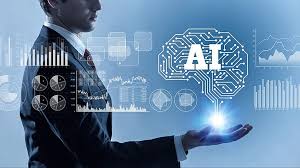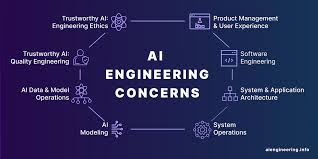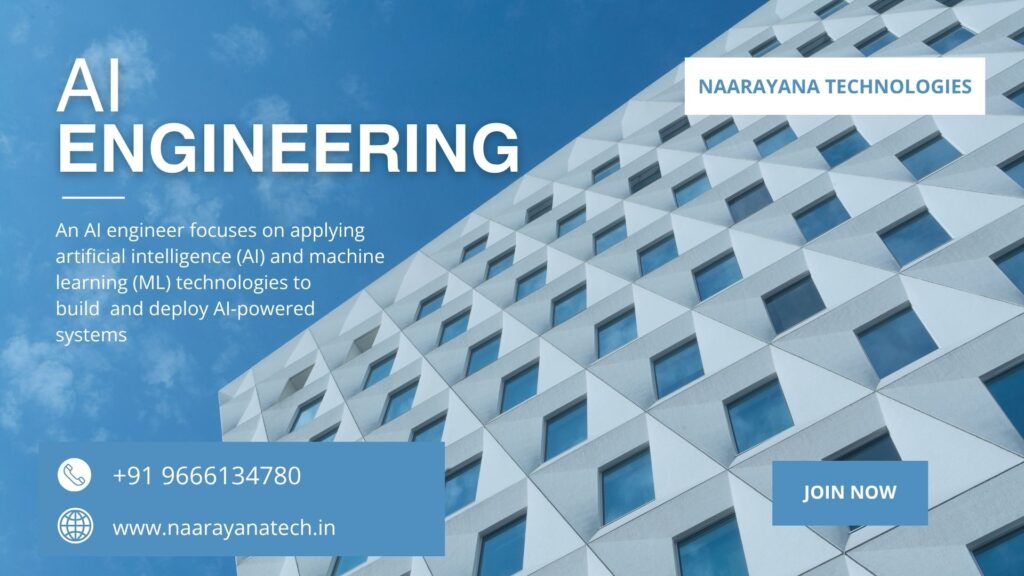Ai engineering instuite in hyderabad


- Develop and train AI models:
AI engineers build and train the algorithms that power AI systems, often using machine learning techniques.
- Design and build AI applications:
They create the software and systems that utilize AI to solve real-world problems.
- Integrate AI into existing systems:
AI engineers work to incorporate AI capabilities into existing applications and infrastructure.
- Ensure reliability and scalability:
They focus on building AI systems that are robust, efficient, and can handle large amounts of data.
- Work with various AI techniques:ai and engineering utilize machine learning, deep learning, natural language processing, and other AI techniques.join & be a ai engineer
engineering with ai
- Automation of Repetitive Tasks:
ai engineering company can automate tedious and time-consuming tasks, freeing up engineers to focus on more complex and creative work.
- Enhanced Data Analysis:
about ai engineering AI algorithms can analyze vast amounts of data to identify patterns and insights that humans might miss, leading to better-informed decisions.
- Improved Design and Optimization:
AI can be used to optimize designs, simulate different scenarios, and identify potential problems early in the development process, leading to more efficient and effective products.
- Streamlined Workflows:
AI can automate various engineering processes, from design and testing to manufacturing and supply chain management, resulting in smoother and more efficient workflows.
- Reduced Operational Costs:
By automating tasks, improving efficiency, and optimizing processes, AI can significantly reduce operational costs for engineering firms.
- Predictive Maintenance:
AI can analyze sensor data from equipment to predict potential failures and schedule maintenance proactively, minimizing downtime and preventing costly repairs.
- Innovation and Creativity:
all about ai engineering can assist engineers in exploring new ideas, generating multiple design options, and developing innovative solutions to complex problems.
- Faster Development Cycles:
By automating tasks, improving simulations, and streamlining processes, AI can significantly accelerate the development and implementation of new products and technologies.
- Increased Productivity and Efficiency:
Overall, artificial intelligence and engineering leads to increased productivity, efficiency, and a higher quality of output across various engineering disciplines.
- Improved Decision-Making:
engineering of artificial intelligence ability to analyze large datasets and identify trends enables engineers and managers to make more informed and data-driven decisions.
- Enhanced Safety:engineering with ai can be used to improve safety in various engineering applications, such as automating hazardous tasks or identifying potential safety hazards in designs.
F A Q
- AI engineering is an engineering discipline focused on designing, developing, and maintaining artificial intelligence systems.
- It involves creating systems that can think, learn, and solve problems through computers, with applications in areas like automatic decision-making, natural language processing, and robotics.
- AI engineering combines principles from computer science, mathematics, and engineering.
- Yes, it is a rapidly growing and in-demand field with a promising future.
- Organizations are increasingly adopting AI technologies, leading to a high demand for skilled AI engineers.
- Programming: Proficiency in languages like Python and R is crucial.
- Machine Learning Frameworks: Familiarity with TensorFlow, PyTorch, and other frameworks is essential.
- Data Science: Strong skills in data manipulation, analysis, and machine learning algorithms are needed.
- Mathematics: A solid foundation in linear algebra, calculus, and statistics is necessary.
- Problem-solving: The ability to analyze complex problems and develop solutions is vital.
- Communication: Effectively explaining technical concepts and collaborating with others is important
How can I become an AI engineer?
- Education:A bachelor’s degree in computer science, information technology, or a related field is a common starting point.
- Specialized Training:Pursue postgraduate studies or certifications in AI, machine learning, and data science.
- Hands-on Experience:Build a portfolio of AI projects to showcase your skills and knowledge.
- Continuous Learning:Stay updated with the latest advancements in AI through online courses, workshops, and industry events.

This will close in 0 seconds

